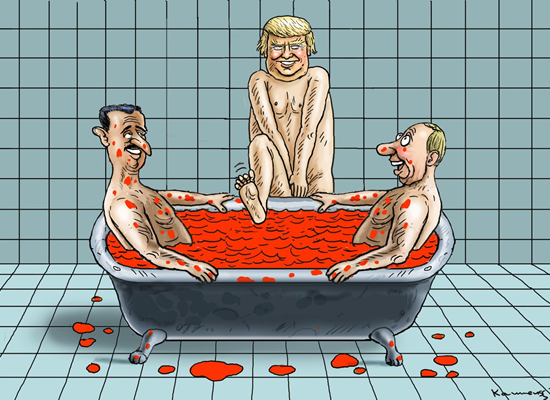Slate
The thorniest question facing the various international powers involved in the war in Syria is the fate of President Bashar al-Assad. Russia and Iran want him to stay in power. Turkey, Saudi Arabia, and the other Gulf states want him gone. The U.S.? It’s complicated.
The Washington Post reported Wednesday that the Trump administration has suspended the covert CIA program to provide arms and training to Syrian rebels fighting against the Assad regime. Coverage of the decision has understandably emphasized that by doing this, the administration is acceding to a long-held Russian demand. But this move is actually no surprise.
The rebels and regional allies have grumbled for some time that the U.S.—always concerned about weapons falling into the hands of jihadist groups—was stingy with its support. And while it was once conceivable that the rebels could put enough pressure on Assad to force him to step aside, ever since Russia began its air campaign in support of the government in late 2015, it’s been clear that his removal was never going to happen—at least, not without far more support for the rebels than either the Obama or Trump administrations would be willing to give. (In contrast to many of his advisers, Obama was always skeptical about the effectiveness of backing the rebels.)
By the time Obama left office, U.S. efforts had been largely redirected toward the fight against ISIS and support for the Kurdish-dominated Syrian Democratic Forces in the country’s north and east. While the SDF is nominally opposed to the Assad regime, it has mostly avoided direct confrontation.
Trump, who during his campaign indicated he was willing to work with the Assad regime and Russia to fight ISIS, was expected to accelerate this trend. But things got more complicated in April when, after a Syrian chemical weapons attack in Idlib, Trump ordered missile strikes on Assad’s air force. That’s when the Trump administration abruptly reversed course, saying that Assad should be forced to give up power. Secretary of State Rex Tillerson even said that “steps are under way” to remove him from power.
But by abandoning the rebels, the U.S. has now given up the one real piece of leverage it had over Assad—and without getting anything in return.
According to the Post, Trump decided to scrap the program a month ago, but the announcement comes after a meeting between Trump and Russian President Vladimir Putin at which the two announced a cease-fire plan in Southern Syria. An anonymous U.S. official denied to the Post that ending the CIA program was a condition of the cease-fire deal, but it’s hard to imagine the two are entirely unrelated.
The U.S. still has a long way to go to extract itself from the Syrian quagmire. The formerly U.S.-backed rebels, many of whom reacted in disbelief, having apparently not been warned that their support was being cut off, will look for other patrons, some of whom may be less discriminating than the U.S. about the type of aid provided and whose hands it ends up in. The cutoff of rebel support, which will likely be read in Syria as U.S. capitulation to Assad and Putin, could also increase the appeal of jihadist groups, including those linked to al-Qaida.
That’s not all: As I noted this week, a full-on clash between rebel groups supported by Turkey—who may now get a boost—and the U.S.-supported Kurdish groups that Ankara views as terrorists, seems almost inevitable. Once ISIS is routed, a clash between the Kurds and the Assad regime is also likely. It’s also unclear what’s to become of the somewhat mysterious U.S. Special Forces program training rebels at an outpost in southern Syria. The U.S. launched a strike on pro-Assad forces in May to protect those rebels. That month, it was reported that both CIA and Pentagon-backed fighters would be receiving more U.S. aid in order fend off advances by Iran-backed militias.
Israeli Prime Minister Benjamin Netanyahu, one of Trump’s most enthusiastic global backers, is opposed to the cease-fire deal with Russia, believing that it will accommodate the Iranian and Hezbollah presence in Syria. The details of the deal are a little murky, so it’s hard to judge to what extent that fear is justified. But there’s no getting around a central contradiction in the Trump administration’s policy: For all that the president has seemingly bought into Saudi Arabia’s worldview and made opposition to Iranian expansionism its defining goal, his willingness to follow Russia’s lead in Syria and enter into a de facto partnership with Assad will only benefit Iran’s agenda. Of course, that’s assuming he’s not still trying to oust Assad. Trump’s intentions here are a little confusing.

